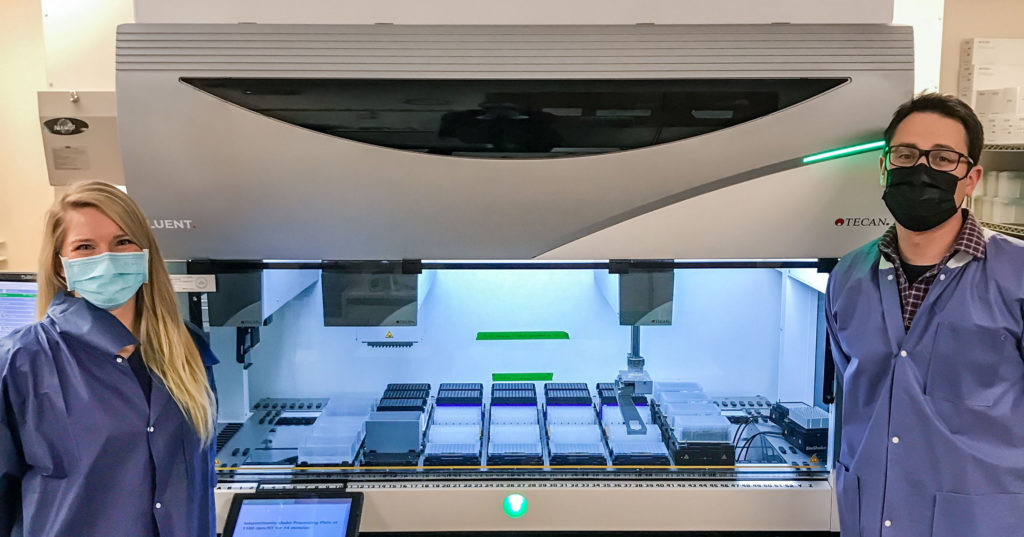Automating a workflow can be a tedious and challenging process that requires lots of time and resources. A helping hand can make all the difference, as it did for Stephanie Dormand, Molecular Supervisor at UniPath Women’s Health, a diagnostics lab located in Denver, Colorado.

The women’s health molecular testing service at UniPath primarily relied on the tabletop Maxwell® RSC Instrument to conduct nucleic acid extractions using the Maxwell® Viral TNA Kit. As their testing needs grew, they required more throughput. Dormand worked with Promega Field Support Scientist Rick Grygiel to implement the Maxwell® HT Viral TNA Kit on the Tecan Fluent 780 liquid handler, raising their throughput from 16 to 96 samples per run. When COVID-19 struck, Dormand worked with Rick to quadruple their testing with the addition of another Fluent 780.
“Promega helped us develop an automated system capable of handling more than a thousand samples per shift at about 40% of the original cost with only two techs needed to work the extractions,” said Dormand. “Rick took something that took 10 staff members and turned it into a 2 staff member job. He enabled us to do more than we could have imagined. The scripting, I cannot even put a price tag on that. That is something we would not have been able to do on our own.”
“He [Rick] enabled us to do more than we could have imagined.”
– Stephanie Dormand, Molecular Supervisor at UniPath Women’s Health
To achieve the increased throughput and reduction in staff time, the workflow was split across the two platforms. The first Fluent 780 supported pre-processing, such as the transfer of samples from the collection tubes to 96-well plates. The second instrument supported extraction through parallelizing as many processes as possible. Rick supported UniPath well beyond his responsibility, to not only develop this higher throughput method on the 780 but to support their entire workflow.
When asked about the challenges Rick helped the lab surmount, Dormand said, “We had a lot of issues to overcome, but I could text Rick anytime and he would immediately start working through them with me. Any time I gave him a question, he would stay up all night until he could find an answer. This is not something you would expect from anyone regardless of their role.”
Reflecting on their biggest challenges, Dormand described their trouble using nasopharyngeal (NP) swabs for COVID-19 testing, which were viscous and sticky with mucus. When attempting to pipette from the swab tubes, the swab would stick to the tip, be dragged across the deck, and would eventually drop, leading to contamination. Therefore technicians were needed to manually remove the swabs prior to loading the instrument. Rick relieved staff of this manual work with a custom method called the “tip dance”, where the pipette moved around the inside of the tube until the swab fell off.
The lab also ran into problems with plastic consumables shortages due to supply chain issues, resulting in the need to reuse pipette tips to run tests. This led to contamination, and Dormand again turned to Rick, who modified the method and created a custom 3D-printed tip isolation box to prevent contamination.
Rick took the time to teach staff the technical skills needed to run automated systems and work with instruments, leaving them well-equipped to maintain a high-throughput workflow and problem-solve when necessary.
“I had never used a Tecan Fluent or that type of automation before this project,” said Dormand. “He taught me how to run everything and how to perform instrument troubleshooting. I was able to teach my staff. He taught us all so much we felt we could troubleshoot independently often with little support from outside technical support.”
“He taught us all so much we felt we could troubleshoot independently often with little support from outside technical support.”
Dormand added, “This training made us a lot better at what we do. I was able to take a lot of what we learned from Rick and apply it to other platforms and workflows. Later, I was able to put our extraction on a totally different instrument without having to call him because he had taught me so much. I think that rolled down the line with the other techs here as well. It made people more comfortable when they ran into issues.”
The Field Support Scientists team at Promega provides personalized solutions to labs seeking to automate their high-throughput workflow. Whether new to automation, in a hurry to get set up or adapting new chemistries to your liquid handler system, our team of experts is available to provide the support you need to implement automated solutions that meet the specifications unique to your lab.
“Rick made something that was hard, easy. His knowledge of the science, the instrument, and how to apply those technical skills towards the problems that arose when automating a workflow was huge,” said Dormand.
When Dormand was asked if there was anything Promega could have done better, she said, “There really isn’t. Promega went so far above and beyond what I would expect from anyone. I mean the service has been unbelievable.”
“Promega went so far above and beyond what I would expect from anyone.”
When it comes to high-throughput workflow, no two laboratories are the same. Field Support Scientists bring a different approach to each lab, and offer solutions tailored to your needs.
Learn more about preconfigured and custom automated nucleic acid extraction solutions.
We have more information about automated nucleic acid extraction right here at Promega Connections and more in our Lab Automation Resource Center.
Latest posts by AnnaKay Kruger (see all)
- Elephants May Call Each Other By Name - July 16, 2024
- Studying Episodic Memory through Food-Caching Behavior in Birds - April 16, 2024
- A Silent Killer: Tracking the Spread of Xylella fastidiosa - March 27, 2024
